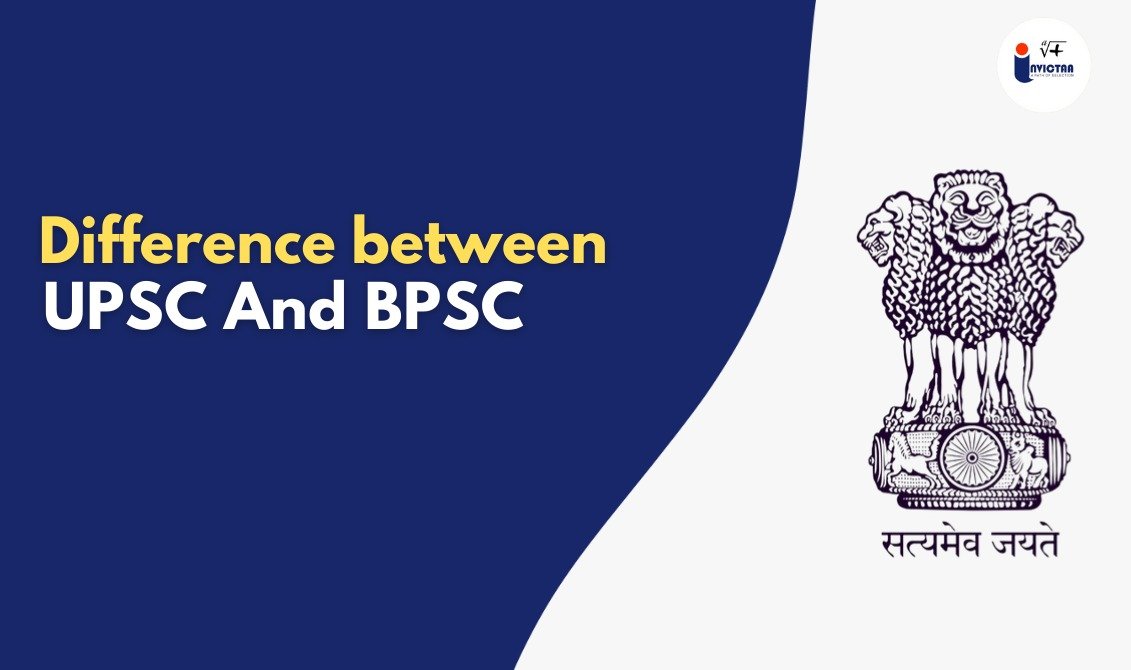Difference Between UPSC and BPSC: UPSC and BPSC differ significantly in their structure, scopes, and roles that prepare candidates to fill administrative roles within India’s government agencies.
Both exams are highly respected but offer different avenues into government positions; UPSC (Union Public Service Commission) offers central recruitment, while Bihar Public Service Commission provides state recruitment in Bihar rather than central recruitment – this article offers an in-depth comparison between them so you can better understand which exam would suit you!
Overview of UPSC and BPSC
UPSC: The Union Public Service Commission (UPSC) holds exams for recruiting candidates into All India Services such as IAS, IPS, and IFS. As an all-India body, it recruits civil servants across India into administrative, diplomatic, and police services that serve their nation effectively.
BPSC: Bihar Public Service Commission (BPSC) is an administrative commission serving Bihar that recruits candidates for state administrative posts such as Bihar Administrative Service (BAS), Bihar Police Service (BPS), and local governance roles. Their primary concern lies within local governance issues within Bihar itself.
| Aspect | UPSC | BPSC |
| Exam Body | Union Public Service Commission | Bihar Public Service Commission |
| Jurisdiction | Central Government of India | State Government of Bihar |
| Services Offered | IAS, IPS, IFS, IRS, and others | BAS, BPS, Bihar Finance Service |
| Frequency | Annually | Annually |
| Focus | National and International Issues | State-specific Issues and Development |
Exam Structure and Syllabus
UPSC Exam Structure
The critical difference between UPSC and BPSC is that the UPSC Civil Services Examination consists of three stages.
Preliminary Exam (Prelims): A screening exam consisting of two objective papers.
Main Exam (Mains): This comprehensive written examination comprises nine papers covering General Studies, optional subjects, and an essay paper.
Personality Test (Interview): Personal Interview that assesses candidates’ suitability for civil service exams such as UPSC’s Civil Services Civilian Competitive Exam. The UPSC syllabus covers Indian politics, history, economics, international relations, and technology.
BPSC Exam Structure
The critical difference between UPSC and BPSC is that BPSC exams follow a similar three-stage process but with different rules and fewer papers:
Preliminary Exam (Prelims): One objective paper focused on general knowledge and current affairs.
Main Exam (Mains): Three papers covering General Hindi, General Studies (2 papers), and an optional subject area.
Interview: Candidates undergo an in-person personality exam to measure their knowledge and decision-making abilities for state roles within Bihar.
BPSC’s exam syllabus focuses more on topics specific to Bihar, such as its history, economy, and geography.
| Exam Stages | UPSC | BPSC |
| Preliminary Exam | Two Papers (General Studies I & II) | One Paper (General Studies) |
| Main Exam | Nine Papers | Three Papers |
| Interview | Personality Test | Personality Test |
| Syllabus Focus | National and International Issues | Bihar-specific Issues |
Eligibility Criteria
The critical difference between UPSC and BPSC is that The eligibility criteria for UPSC and BPSC are similar but slightly different.
UPSC Eligibility
Age Restrictions for General Category Candidates (21-32). Relaxations are provided for other categories.
Educational Requirement: A bachelor’s degree from an approved university is required.
Nationality Eligibility is for IAS and IPS only, while nationals from some nearby countries may also apply for some services.
BPSC Eligibility
Age Restrictions for Male Candidates in the General Category (20-37) and Female Candidates and Reserved Categories, such as PWD Applicants.
Educational Requirement (like UPSC ): A Bachelor’s degree is needed, as is residency in Bihar State
Exam Difficulty and Competition
UPSC Exam Difficulty
The critical difference between UPSC and BPSC is that UPSC is well known for its complex examination due to its exhaustive curriculum, fierce competition, and rigorous selection process. Over 10 lakh candidates apply yearly, yet only several hundred make the cutoff list and earn admission into this highly selective institution.
BPSC Exam Difficulty
Although Bihar Public Service Commission exams (BPSC) can also be difficult, their selection process tends to be less demanding than UPSC, as Bihar-specific topics dominate discussions during oral rounds. Around four or five lakh applicants appear yearly, with many making it to various positions within this examination system.
Job Profile and Scope
UPSC Job Roles
The critical difference between UPSC and BPSC is that UPSC selection leads to careers with all India Services, such as IAS and IPS, that involve decision-making at national and state levels on issues related to law enforcement, rural development, foreign policy, and public welfare, as well as others.
Job Roles at BPSC
Bihar Professional Service Commission candidates serve as Bihar Administrative Service Officers (BASO), Bihar Police Service (BPS) officers, or in other state departments as officers responsible for local governance, public welfare issues, and implementation of state policies.
Salary and Growth Prospects
UPSC Salaries and Benefits
The critical difference between UPSC and BPSC is that Starting salaries of IAS or IPS officers typically begin around Rs56,100 monthly before allowances. As they gain experience and advance through higher pay grades, they may hold significant authority at both central and state levels; additionally, they receive government housing assistance, official vehicles for use within service duties, and retirement benefits.
BPSC Salaries and Benefits
Starting salaries of BPSC officers range between Rs35,000 – Rs45,000 monthly, depending upon their roles. There are opportunities for growth within state bureaucracy; promotions depend upon the experience, performance, and seniority of officers; state benefits, including accommodation and transport, are provided, and retirement plans are awarded through state contracts.
Also read: UPSC Selection Process 2024
FAQs on the Difference Between UPSC and BPSC
Q1. What are the main difference between UPSC and BPSC?
Ans The UPSC exam is for federal positions such as IAS and IPS, while BPSC serves to recruit administrative roles within Bihar state.
Q2. What are the difference between UPSC and BPSC in exam structures?
Ans: UPSC offers more comprehensive examinations with multiple papers covering national issues. BPSC typically only consists of several, more targeted examinations that address Bihar-specific matters.
Q3. Does UPSC offer more competitive prices than BPSC?
Ans: UPSC is more competitive due to its national scope and large applicant pool, while BPSC focuses on state-level roles, which makes competition less intense.





